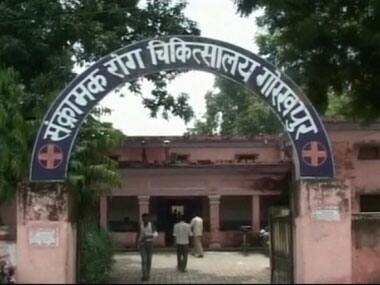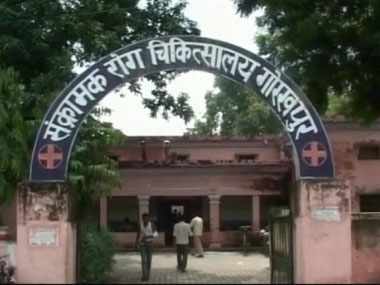While the entire country remains fixated on the riveting political battle in Varanasi, neighbouring constituency Gorakhpur, which also goes to polls on the same day, 12 May, braces itself for a looming crisis. It’s a familiar crisis in this eastern Uttar Pradesh region: encephalitis. The disease has claimed at least 50,000 lives since 1978 and there is no end to the problem in sight. In the peak monsoon, this disease, which is not traditional Japanese encephalitis but a more deadly water borne, entero viral kind, takes more than a 1000 lives every year. With a problem of this magnitude, public health and hygiene should have been one of the major talking points in the general elections. But that, rue locals and healthcare experts, has not been the case. [caption id=“attachment_1517375” align=“alignleft” width=“380”]
 A file photo of a hospital in Gorakhpur. Ibnlive[/caption] “Every year, a thousand kids die from polluted water but the gravity of the situation has still not sunk in. People are swayed by issues of caste and fall for poll-time inducements, including money,” says Dr D Kuswaha, the principal of BRD medical college in Gorakhpur, the only hospital in UP with a department dedicated to encephalitis. “It’s utterly sad that politicians are always let off the hook,” he tells Firstpost. The healthcare system in the constituency is in shambles. However, simple initiatives could help. “All we need is Mark 2 hand pumps in this region so that unpolluted water can be fetched from deeper in the ground. Our politicians are hardly bothered about such things,” says a health care activist on the condition of anonymity. He directly accuses the sitting MP Adityanath of turning a blind eye towards the healthcare system. “How much of his MPLAD fund has been used to eradicate this health hazard here?” he asks. Another issue which has left this area devastated is power cuts. Locals claim that power outage for 12-15 hours everyday is common. Even the only hospital meant for the epidemic disease is not spared. “Every year at least five children die in the ICU just because there is a power outage,” says a junior doctor in BRD medical college. Against this gloomy backdrop, there’s one silver lining. For the first time in the history of the constituency, a political party is making healthcare an electoral issue. Aam Aadmi Party’s candidate Radhe Mohan Mishra, one of the chief campaigners against encephalitis, has been urging people to focus on their immediate problem. “I urge people of Gorakhpur not to vote for issues like religion and caste or for freebies, but vote for the future of their children,” Mishra, a former vice chancellor of Gorakhpur University, says. It is he who had unearthed, through his RTI activism, that compared to other districts of UP, Gorakhpur had received little funds for its healthcare facilities. However, the public interest on his campaign issue appears low. A journalist from Gorakhpur explains,“While issues like health or water keeps haunting the people so much around the year, the politicians have realised that the only way to keep them distracted is through caste and communal tension. After all that’s easier and cheaper.”
A file photo of a hospital in Gorakhpur. Ibnlive[/caption] “Every year, a thousand kids die from polluted water but the gravity of the situation has still not sunk in. People are swayed by issues of caste and fall for poll-time inducements, including money,” says Dr D Kuswaha, the principal of BRD medical college in Gorakhpur, the only hospital in UP with a department dedicated to encephalitis. “It’s utterly sad that politicians are always let off the hook,” he tells Firstpost. The healthcare system in the constituency is in shambles. However, simple initiatives could help. “All we need is Mark 2 hand pumps in this region so that unpolluted water can be fetched from deeper in the ground. Our politicians are hardly bothered about such things,” says a health care activist on the condition of anonymity. He directly accuses the sitting MP Adityanath of turning a blind eye towards the healthcare system. “How much of his MPLAD fund has been used to eradicate this health hazard here?” he asks. Another issue which has left this area devastated is power cuts. Locals claim that power outage for 12-15 hours everyday is common. Even the only hospital meant for the epidemic disease is not spared. “Every year at least five children die in the ICU just because there is a power outage,” says a junior doctor in BRD medical college. Against this gloomy backdrop, there’s one silver lining. For the first time in the history of the constituency, a political party is making healthcare an electoral issue. Aam Aadmi Party’s candidate Radhe Mohan Mishra, one of the chief campaigners against encephalitis, has been urging people to focus on their immediate problem. “I urge people of Gorakhpur not to vote for issues like religion and caste or for freebies, but vote for the future of their children,” Mishra, a former vice chancellor of Gorakhpur University, says. It is he who had unearthed, through his RTI activism, that compared to other districts of UP, Gorakhpur had received little funds for its healthcare facilities. However, the public interest on his campaign issue appears low. A journalist from Gorakhpur explains,“While issues like health or water keeps haunting the people so much around the year, the politicians have realised that the only way to keep them distracted is through caste and communal tension. After all that’s easier and cheaper.”
Gorakhpur: In the encephalitis zone, caste, religion trump healthcare
Soumik Mukherjee
• May 10, 2014, 20:55:32 IST
While the entire country remains fixated on the riveting political battle in Varanasi, neighbouring constituency Gorakhpur, which also goes to polls on the same day, 12 May, braces itself for a looming crisis. It’s a familiar crisis in this eastern Uttar Pradesh region: encephalitis.
Advertisement
)
End of Article